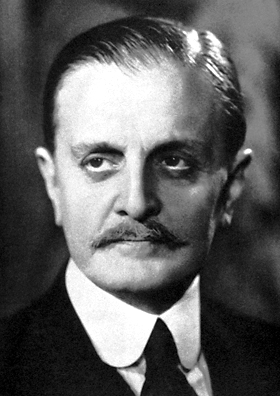<Back to Index>
- Jurist Carlos Saavedra Lamas, 1878
- Writer Johan Nordahl Brun Grieg, 1902
- President of Nicaragua José Santos Zelaya López, 1853
PAGE SPONSOR

Carlos Saavedra Lamas (November 1, 1878 – May 5, 1959) was an Argentine academic and politician, and in 1936, the first Latin American Nobel Peace Prize recipient.
Saavedra, born to an upper class family in Buenos Aires, was an outstanding student who received his doctorate in laws from the University of Buenos Aires, and then began a career as a teacher of law and sociology at the National University of La Plata, eventually rising to the position of professor at Buenos Aires.
As an academic, some of his major published works concentrated on labor law, placing an emphasis on the need for a universally recognized doctrine on the treatment of labor. Some of his most important works in this field are Centro de legislacíon social y del trabajo (1927),Traités internationaux de type social (1924), and the National Code of Labour Law (Código nacional del trabajo, 1933). He was involved in the early stages of the International Labour Organization (ILO), and much of his work eventually ended up being the basis of Argentina's own labor laws.
His political career began in 1906 through a succession of steadily more important roles, including two terms in the Argentinian parliament beginning in 1908, where his interests were mainly in foreign affairs. In 1915, he became Minister for Justice and Education. The achievement for which he received the Nobel Prize was as Argentina's foreign minister, which he was from 1932 to 1938 (during the presidency of Gral. Agustín Pedro Justo), mediating a treaty that effectively ended the Chaco War between Paraguay and Bolivia and instigating several multilateral nonaggression treaties between a number of South American and European countries. The most notable of these was the innovative South American Anti - War Pact, which, in case of a war between two or more signatories, bound all remaining countries to create special committees for the ceasing of the hostilities and to take diplomatic or economic actions against both offending parties until they agreed to stop their hostilities. This treaty was ratified by most Latin American nations, and later was well received in a presentation in the League of Nations, which prompted eleven other American and European nations to sign it.
In 1936 he was elected President of the Assembly of the League of Nations. On 25 November of the same year, he was awarded the Nobel Peace Prize.
Saavedra married Rosa Sáenz Peña González (1887 - 1965), the daughter of former Argentinian president, Roque Sáenz Peña.
From 1941 to 1943 he was president of the University of Buenos Aires, and then professor until 1946.
Carlos Saavedra is buried in La Recoleta Cemetery in Buenos Aires.